Why Are Detroit Cops Killing So Many Dogs?
A Reason investigation reveals widespread, unchecked violence against pets during drug raids-including two officers who have shot more than 100.
A group of Detroit police officers executing a narcotics search warrant knocked on Nikita Smith's door on January 14, 2016. The only fact that both Smith and the officers agree on after that point is that, a short while later, Smith's three dogs were all shot dead.
What really happened in the moments between could be a costly question for the city of Detroit. In a federal civil rights lawsuit filed in May, Smith says the Detroit police executed her three pit bulls, Debo, Mama, and Smoke, without provocation. Essentially, they acted as a "dog death squad."
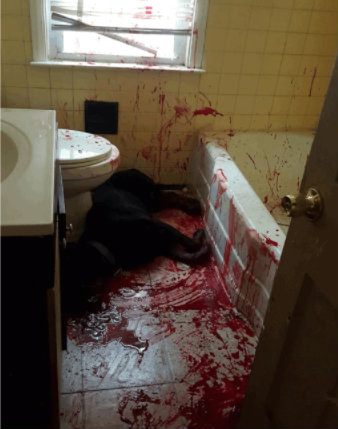
According the lawsuit, Smith tried to tell the officers she was putting her dogs away, and placed two in the basement and one in the bathroom. As the officers burst into the house, Debo slipped back upstairs. The officers shot it as it sat down by Smith. Next, they charged into the basement and shot Mama, who was pregnant and backed into a corner. Finally, they moved onto the bathroom, where Smoke was closed in.
One of the officers cracked the door open, peeked inside, and closed it again. "Should we do that one, too?" the officer asked, according to the lawsuit, before two of them fired through the closed door, killing Smoke.
In the police version of the story, told through reports filed after the raid, the officers received no response when they announced their presence and forced entry into the house. Inside, they encountered a "vicious grey pit bull" that charged at them. It was shot eight times. In the basement, they encountered another "vicious white pit bull" that charged toward them. It was shot five times. According to police reports, the third dog charged out of the bathroom toward the officers and was shot.
However, extremely graphic photos entered into evidence in the case show bullet holes riddling the outside of the door and the dog dead inside the bathroom.
"They produce two photos of the dead dog in the bathroom," Chris Olson, Smith's attorney, says. "It looks like The Shining. The dog is in the back of the bathroom and just covered in blood. But their story is that the dog opened the door itself and was coming to eat them. The problem is the door handle wasn't a latch. It was a knob. That's how fucked up it is. That's their story in federal court."
After shooting her dogs, the police arrested Smith for possession of marijuana and seized her car under civil forfeiture laws. The charges were later dropped, however, when the officers failed to appear at her court date.
Puppycide's Long, Sad History
Stories like Smith's happen all the time. They're so common that they've become known by the grim moniker puppycide. There's a whole category on Reason's website for such events, a 16,000-person-strong Facebook group that tracks local media reports of them, and even a database that attempts to collect information on dog shootings nationwide. But no one knows how many dogs are in fact killed by police every year.
A Justice Department official speculated in a 2012 interview with Police magazine that the number could be as high as 10,000 a year, calling it "an epidemic." That figure that is often repeated in media reports about dog shootings, but it's little more than a guess. A 2012 study by the National Canine Research Council estimated that half of all intentional police shootings involved dogs. There are no reporting requirements, unlike for other use-of-force incidents. Considering the U.S. doesn't even accurately track how many humans are killed at the hands of cops every year, it's no surprise the picture is so murky when it comes to dogs.
To shed light on the phenomenon in one U.S. city that's been hit with a series of lawsuits over dog shootings, Reason obtained the "destruction of animal" reports filed by Detroit Police Department (DPD) officers in 2015 and the first eight months of 2016. The reports provide a broader context for the individual shootings that have drawn local and national media attention. Unfortunately, they also illustrate the difficulty of getting public information from a major police department on how its officers use deadly force.
Detroit police officers killed at least 25 dogs in 2015. So far in 2016, they've shot at least 21. One officer was bitten by a dog during that time period, according to the records. There were two fatal dog attacks in Detroit in 2015 and 2016. The victims were a 4-year-old boy and a 71-year-old woman.
How do those numbers compare to other major metro areas? It's hard to say. In Chicago—a city with 2.7 million people compared to Detroit's 680,000—there were 84 incidents in which an officer fired a weapon at an animal over the same time period, according to public records obtained by Reason. In New York City, the 35,000 sworn officers of the NYPD killed nine dogs in 2014, the last year for which the department released detailed information about weapon discharges by officers. The Los Angeles and Philadelphia police departments rejected records requests for similar information, although the LAPD has admitted to killing eight dogs in 2015.
But the Detroit numbers too are incomplete. At least seven incidents registered in lawsuits and media coverage were nowhere to be found in the documents released to Reason. The Detroit Law Department, which handles public records requests for the city, said it never received those reports, which means the DPD either failed to find them—indicating a lax commitment to record keeping—or intentionally hid them, in violation of Michigan law. Either way, the actual number of dogs shot by police in Detroit is unknown and possibly much higher than the records would imply.
Detroit police officers killed at least 25 dogs in 2015. So far in 2016, they've shot at least 21.
The reports do show that in some cases, Detroit police were forced to do their best to control large, aggressive dogs running loose on the streets, sometimes in order to protect residents and other animals from being attacked. In some cases, officers spent hours trying to control loose dogs, often without any available animal control professionals to help them. Police have responded to more than 3,500 911 calls regarding dogs so far this year, according to data released by the city.
In other cases, though—especially during narcotics raids—officers have been known to leave a bloody trail of destruction behind them, with the officers' narratives often differing wildly from the stories told by the' owners. Instead of simply acting to protect themselves from "vicious, charging" animals, these folks say, Detroit police executed their dogs while the owners pleaded with them to stop. DPD officers shot some dogs while they were chained or confined, shot others merely for growling, and in some cases chased dogs from room to room and shot them multiple times before they finally died.
Vicious Dogs
Detroit Police Directives state that "an officer may shoot a dangerous animal that is posing an imminent threat of danger to the officer or others and only when the bystanders are not in jeopardy." In nearly every report where an officer killed a dog, the animal is described as "vicious" and charging toward police when it was shot. Supervisors reviewing these incidents found officers acted within department guidelines in every single one of the 40 reports reviewed by Reason.
Olson, however, says Detroit police have developed a pattern and practice of shooting dogs just for barking. According to an unredacted police report he provided, one of the officers who raided Smith's house, William Morrison, had shot 39 dogs prior to that day.
"That's a staggering number, and that's just one officer out of six involved in that case. Someone who's killed 39 dogs in the course of duty," Olson says, pausing, "is really hunting."
Morrison was previously a defendant in a 2010 civil rights lawsuit alleging excessive force and false arrest, as was Detroit Police Sergeant Roy Harris, who is also a defendant in Smith's suit. The earlier claim was settled for an undisclosed amount in 2012.
Morrison's kill count is far from the highest in the department. One Detroit police officer in the Major Violators Unit, which has handled drug raids since the city's scandal-ridden narcotics unit was disbanded in 2014, has destroyed 67 animals over the course of his time at the DPD, according to the police reports obtained by Reason. The officers' names and badge numbers were redacted in all of those reports, making it difficult to learn more about their careers.
The following account of that officer's 67th kill comes from a "destruction of animal" report filed after an April 14, 2016 narcotics raid:
Once the front door was breached, there was an Adult Size Vicious Pit Bull that would not allow the Crew entry inside the home. The canine viciously growled, showing his teeth. The action of the canine left no other alternative but to fire, putting the canine down […] Crew members continued to clear the location, to find no one inside.
Family Pets, Shot Through a Barrier

Smith's case is only one of several lawsuits filed this year against the Detroit Police Department for shooting family pets.
On January 27, a couple of weeks after the raid on Smith's house, officers from the Major Violators Unit broke down the door and stormed into Nicole Motyka and Joel Castro's house. It was another narcotics raid. The unit had tried to initiate an undercover marijuana buy from the house, according to a search warrant and affidavit, but the buyer came back empty-handed after Castro refused to sell to him. The police decided to raid the house anyway.
Inside, the situation quickly devolved into a bloodbath similar to the one at Smith's house. Motyka and her husband say their three pit bulls—YoYo, Blanca, and Junior, a one-year-old puppy—were behind a large wooden barrier in the kitchen.
According to officer testimony, the officers ordered Castro to the ground, where he yelled several times, "All I have is weed. Don't kill my dogs."
At this point, the officers' statements conflict. One DPD officer said the dogs charged when one of the officers "attempted to move the board out the way to enter the kitchen to clear the rest of the house."
But another officer testifying at the same hearing said the barrier was still in place, and the two dogs were trying to get through it. "They were trying to move the board and coming viciously," he said.
Motyka says the officer shot two of her dogs, including the puppy, over the barrier while the animals cowered in a corner of the kitchen. According to Motyka, one of the officers said, "We got some big ones here today," as animal control removed the dogs' bodies.
The Detroit Police were correct about there being drugs inside the house: 26 marijuana plants, to be exact. What they neglected to discover before busting open Motyka and Castro's door, detaining them at gunpoint, and shooting two of their dogs was that Castro was a state-licensed medical marijuana caregiver, meaning all the plants were legally owned. Castro and Motyka were arrested on drug charges, which have since been dropped. The Detroit police also tried to seize cash found at the house under asset forfeiture laws, but they ultimately failed in that endeavor as well.
"Someone who's killed 39 dogs in the course of duty," Olson says, pausing, "is really hunting."
Motyka and Castro filed a federal civil rights lawsuit in August against the city of Detroit and several of the police officers involved in the raid. The lawsuit argues Detroit enabled the violation of Motyka and Castro's constitutional rights by failing to properly train and monitor its police officers, and that the city has a de facto policy allowing such unconstitutional raids.
"I don't want anything to do with the Detroit police anymore," Motyka says. "You grow up being taught these are the people you're supposed to trust, and then they come in and kill your family. I have no love for them. None. They probably sleep well at night. We don't."
In nearly all of the recent incidents, the owners describe the Detroit police as being callous, even lighthearted, after shooting their dogs.
Two other Detroit residents represented by Olson, Hazell Hayes and Melvin Short, also filed a federal civil rights lawsuit against the city in June after their dog Penny was shot during a police search. "Y'all over here shooting dogs now?" a city employee asked a DPD officer in the aftermath of the raid, according to the lawsuit.
"Nah, it committed suicide," the officer allegedly replied.
Expensive Settlements
"Sergeant [REDACTED] announced crew's presence and purpose, then ordered forced entry through the front door. The officers proceeded to enter the location when they encountered a vicious pit bull that was foaming at the mouth and growling/barking aggressively. The pit bull charged at the officers. Fearing for their safety, Officer [REDACTED] fired one (1) shot from his department issued shotgun … and sergeant [REDACTED] fired one (1) shot from his department issued handgun, both striking the pit bull in the body area. The pit bull then retreated further into the residence. As the crew were clearing the residence, Officer [REDACTED] encountered the pit bull in the bathroom. The pit bull was bleeding profusely and began aggressive growling at Officer [REDACTED]. Fearing for their safety, Officer [REDACTED] fired two (2) shots striking the pit bull in the body area fatally wounding him. The crew proceeded to clear and secure the location with no further incidents […]
Also recovered and confiscated from this location was 0.4 grams crack cocaine with a street value of $160, multiple packaging baggies, and confiscated $341.00 in US Currency." —Detroit Police Destruction of Animal Report, March 4, 2016
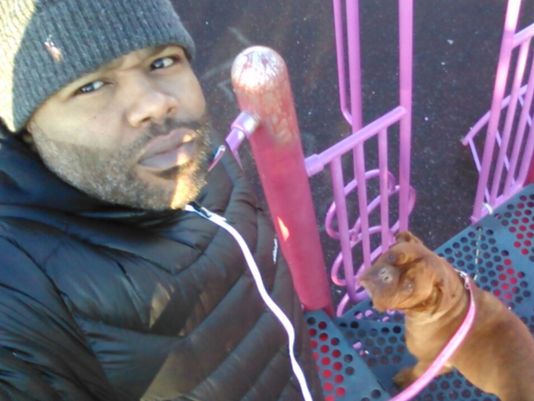
On July 11, Durone Sanders and his pregnant fiancee had just moved into a new house on the east side of Detroit when they suddenly heard gunfire. Heavily armed police officers had shot their two-year-old pit mix through the back door. The bullet traveled through the dog and struck a living room wall inside. Police told Fox 2 Detroit they were searching for drugs, although the search warrant they used was for an unidentified man for an unspecified crime. The police ticketed Sanders and his fiancee for living in a vacant home and left.
These incident have already imposed significant legal costs on Detroit. In February, the city approved a $100,000 settlement with resident Darryl Lindsay after a police officer shot his French mastiff, Babycakes, while she was chained up outside his house. Lindsay says Babycakes was "very friendly."
"It was a people dog," he says. "I walked the riverfront every couple of days with her, and everybody wanted to pet her. She was more like a family member to me, because all my kids are grown. Like my new daughter."
Lindsay was sitting in his house eating lunch a little after 1 p.m. when he heard his dog barking. A group of DPD officers were gathered outside his house. There had been a report of gunshots fired from nearby, and the officers wanted to search Lindsay's backyard; the dog was standing in their way, secured to a fence with a metal chain.
Lindsay tried to open his window and ask for permission to bring his dog inside, but he says the officers pointed their guns at him and told him to stay where he was. A little while later, Lindsay heard the shots. Dash cam footage from a police cruiser shows an officer walking up to the dog, still chained, and shooting it twice. Another officer, exasperated, can be heard remarking on the video, "That dog ain't had shit to do with it."
The destruction of animal reports from the Lindsay, Sanders, Motyka, Smith, and Hayes cases were all missing from the documents handed over to Reason by the Detroit Police Department. Also missing were reports from a 2015 incident where an officer shot three dogs that were mauling a small child.
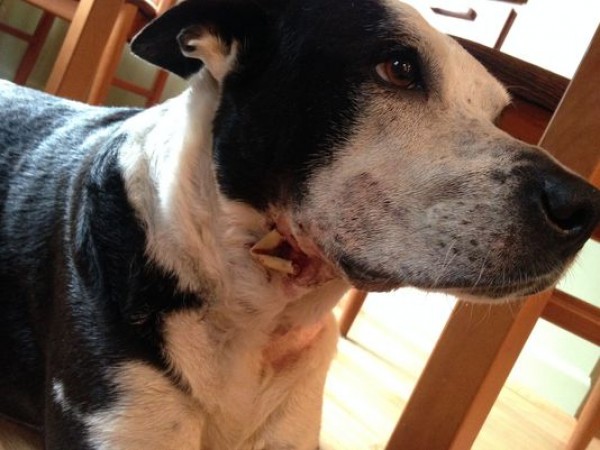
Detroit has settled in at least one other case: In May 2015, local country singer Alison Lewis was playing with her cattle-dog mix Millie in the open field where the old Tigers Stadium used to stand when the dog ran up to a police officer. The officer shot Lewis' dog in the face. Police described it as a jumping, barking pit bull that charged the officer, according to the Detroit Free Press. "That's absolutely not true," Lewis told local news channel WXYZ. According to Lewis' lawyer, Bill Goodman, the city of Detroit settled with her for $8,000, covering her veterinary costs and time lost from work. The dog survived.
Of course, Detroit is not the only city being hit with major lawsuits for shootings dogs. In September, a federal jury ordered the city of Hartford, Connecticut, to pay a whopping $200,000 to a family whose St. Bernard was shot by city police in 2006. Commerce City, Colorado, settled a dog shooting case in January for $262,500. In some of these cases, individual officers are being held liable for not just compensatory damages for the dog itself, but also punitive damages for emotional distress inflicted on the owners.
These hefty settlements are a relatively recent legal development, stemming from a 2005 ruling by the Ninth Circuit Court of Appeals that found that unjustified shootings of dogs by police are a violation of the Fourth Amendment's protections against unreasonable search and seizure. In that case, the city of San Jose was forced to pay out nearly $1 million to the families of two members of Hell's Angels whose dogs were shot by police during the execution of a search warrant.
The DPD declined to comment on any pending litigation for this story. It also refused to say what sort of training it offers or policies it has in place to govern officer encounters with dogs.
A public information officer told me I would have to put in a Freedom of Information Act (FOIA) request for those policies. While that sounds like a frustrating but typical response from a government agency, in this case it was also an obtuse one: Earlier this year I submitted a FOIA request for Detroit Police Department's manual of directives and was told they were exempt from disclosure.
A Clash Between Family Dogs and Militarized Police Tactics
There are currently around 83 million dogs in the U.S. Over the past century, they went from being outside farm animals to beloved family members. But at the same time that dog ownership started exploding in the U.S. in the '70s, so did the volatile police raids used to prosecute the drug war. The use of SWAT teams rose from around 3,000 deployments per year in 1980 to as high as 80,000 a year currently, putting more heavily armed officers than ever before in potentially violent confrontations with families and their pets.
"The two trends have collided in the family home," says Michael Oz, director of a documentary, Of Dogs and Men, released this summer that explores the topic.
Responding to costly lawsuits and media attention, several states now mandate training for officers on dealing with dogs. Colorado passed the Dog Protection Act in 2013. (Reached for comment, the Denver Police Department says it does not track dog shootings, so it couldn't determine whether the training had resulted in fewer incidents.) In Texas, the state legislature mandated dog training for police thanks to a three-year effort by Cindy Bolling, whose Border collie mix was shot by a police officer in 2012. And in Maryland, SWAT teams are required to report use-of-force incidents, including dog shootings, after a notorious 2008 drug raid on the house of the mayor of Berwyn Heights.
But many departments still don't train officers on how to read dog behavior. "In most cases, at best they get no training and no policy," Oz says. "At worst, there are departments where shooting the dog remains a matter of policy."
In smaller cities that receive less media and legal scrutiny, some police departments have shot a shocking number of dogs. Buffalo, New York, police, for instance, shot 92 dogs between 2011 and 2014, almost a quarter of them by one officer alone. The Palm Beach, Florida, Sheriff's Department shot 26 just in 2012.
The federal Justice Department has taken some steps to try to teach officers how to handle dogs. Dog trainer Brian Kilcommon produced a series of videos several years ago for the department's Community Oriented Policing Services program to train local and state officers on how to read dog behavior and respond to it appropriately. The videos are free to any police department that wants to use them, although Olson, the Detroit attorney, says none of the officers he's deposed has watched them.
Police officers and dogs, Kilcommon says, suffer from a deadly misunderstanding. The body language that police are trained to use on duty—imposing and authoritative—is the same body language that dogs read as a threat. And the behavior that dogs respond to a threat with—barking and growling—is the same behavior that leads police to shoot them.
"Dogs are there to warn the owner," Kilcommon says. "That same warning sequence is what gets them killed, because police don't know what they're looking at. I fully support police officers protecting themselves from being hurt. What is troubling is in many of these situations, there is not a threat. Their lack of education and understanding creates the situation. You look at some of the videos, and as far as I'm concerned, they're absolutely at fault."
Many police departments still don't train officers on how to read dog behavior.
For instance, the New York City Civilian Complaint Review Board found earlier in October that an NYPD officer abused his authority when he shot a woman's dog a split-second after it slipped out the door of an apartment and began walking toward him, wagging its tail.
Cynthia Bathurst, executive director of the animal welfare group Safe Humane and also a co-producer of the Justice Department videos, says that while videos help, "there's nothing better than face-to-face." Bathurst says one Chicago SWAT team she's worked with has executed roughly 1,000 search warrants over a 10-year-period and only shot one dog.
"Please don't shoot my dogs!"
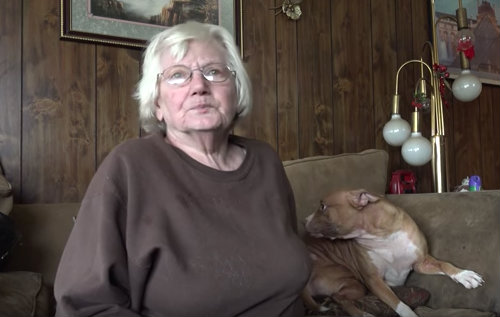
"Charged by white pit bull. Officer [REDACTED], fearing being bitten by the dog, fired one round from his department approved shotgun at the dog. The first round missed the dog and struck the floor and bottom of the wall. Officer [REDACTED] then fired a second round, striking the dog in the left shoulder. The dog then fled under a drawer in a hallway closet. Officer had to get onto the ground to get a clear shot. Officer [REDACTED] fired one shot from his department issued handgun, striking the dog in the left shoulder. The dog then fled to the bathroom and hid behind the toilet. The dog being in extreme distress, Officer [REDACTED] fired one more shot striking the dog in the head killing it." —Detroit Police Department Destruction of Animal Report, October 21, 2015
In Detroit, the number of drug raids has fallen steeply in recent years, from 3,462 in 2012 to 855 in 2015. The city says it's focusing in on big-time drug crimes, hence the name of the Major Violators Unit. But that still amounts to more than two raids a day—two violent, armed encounters per day between police, residents, and often their pets.
If the police narratives of these encounters are taken at face value, one might get the sense that every one of the dogs that DPD encounters on its drug raids is a violent animal trained to protect its violent drug-dealer owners.
For example, one of the destruction of animal reports obtained by Reason describes a December 1, 2015, narcotics raid on a house in west Detroit that resulted in the confiscation of a large bag of marijuana, a shotgun, and four empty pill bottles. Officers also shot three vicious, charging pit bulls, according to the report, killing one and wounding the other two.
What the police report doesn't mention is who else was in the house when officers started breaking down the door: Danuta Malysz, an elderly woman who has lived in the neighborhood since 1968.
"He was aiming the gun at the dogs, and I started screaming, 'Please don't shoot my dogs, please don't shoot my dogs!'" Malysz recalled in an interview with the World Animal Awareness Society a day after the incident. "He said, 'How many dogs do you have?' I said four, and one is the neighbor's. And then he started shooting."
Malysz was removed from the house by police after the first dog was shot. When the officers left and she was allowed back inside, she found her three dogs shot and bleeding out. She couldn't walk in the kitchen because the "floor was bloody, completely covered in blood." One of her dogs had been hit in the hindquarters, which is an unusual angle for a bullet to strike a charging, vicious pit bull.
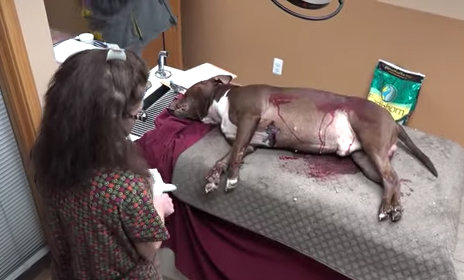
Malysz said one of the officers told her as they were leaving, "Don't blame us, blame your grandson."
Over and over again, residents say the Detroit police officers who shot their dogs shrugged it off, as if it were a common and unavoidable occurrence. The experience has left owners like Darryl Lindsay, who received a $100,000 settlement, not only traumatized but bitter.
"They need some damn sensitivity training or something, I don't know what," Lindsay says of the DPD. "They come into your house and kill your family member and don't say nothing. Money is nothing. You couldn't give me enough for my dog. That's my damn dog. And then every time you hear a dog bark, you wonder if it's going to happen again."
Police are routinely asked, especially in cash-strapped cities like Detroit, to handle much more than traditional beat work, including things like mental health services and animal control. Without proper training and resources, they're often put in unwinnable situations.
But on the other side of the national debate on policing that has erupted over the last two years are communities demanding to be policed like communities rather than combat zones. If the Detroit Police Department doesn't reform policies that treat beloved pets like collateral damage in the war on the drugs, the shootings, and the lawsuits, seem practically guaranteed to continue.
"They don't need to be dog trainers," Safe Humane's Bathurst says of police. "They just need to know what to look for and defuse or control the situation with the resources available. It's the compassionate and right thing to do. It's better for community relations. And if that doesn't move them, the huge lawsuits should."


Show Comments (294)